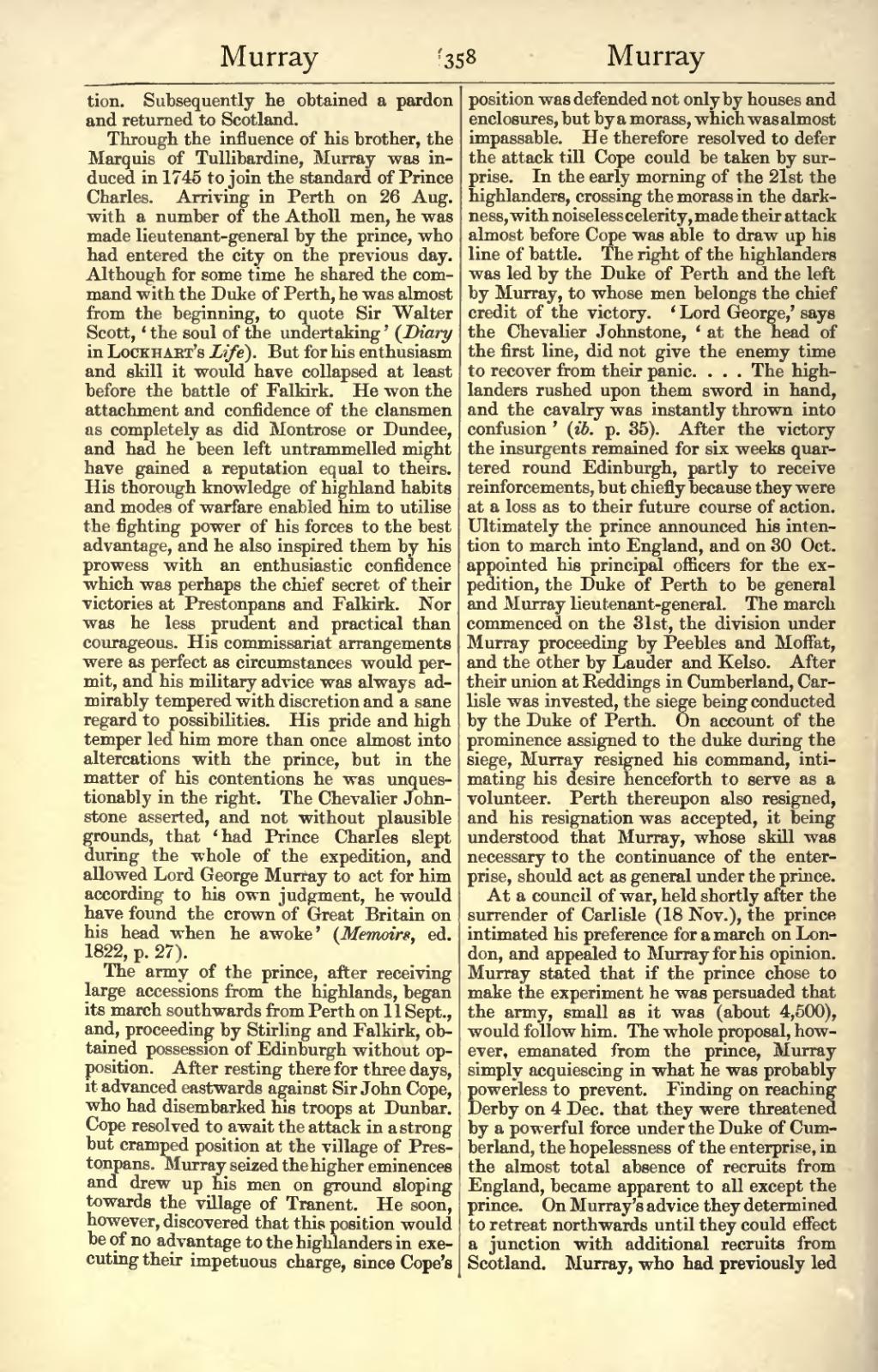tion. Subsequently he obtained a pardon and returned to Scotland.
Through, the influence of his brother, the Marquis of Tullibardine, Murray was induced in 1745 to join the standard of Prince Charles. Arriving in Perth on 26 Aug. with a number of the Atholl men, he was made lieutenant-general by the prince, who had entered the city on the previous day. Although for some time he shared the command with the Duke of Perth, he was almost from the beginning, to quote Sir Walter Scott, 'the soul of the undertaking' (Diary in Lockhart's Life). But for his enthusiasm and skill it would have collapsed at least before the battle of Falkirk. He won the attachment and confidence of the clansmen as completely as did Montrose or Dundee, and had he been left untrammelled might have gained a reputation equal to theirs. His thorough knowledge of highland habits and modes of warfare enabled him to utilise the fighting power of his forces to the best advantage, and he also inspired them by his prowess with an enthusiastic confidence which was perhaps the chief secret of their victories at Prestonpans and Falkirk. Nor was he less prudent and practical than courageous. His commissariat arrangements were as perfect as circumstances would permit, and his military advice was always admirably tempered with discretion and a sane regard to possibilities. His pride and high temper led him more than once almost into altercations with the prince, but in the matter of his contentions he was unquestionably in the right. The Chevalier Johnstone asserted, and not without plausible grounds, that 'had Prince Charles slept during the whole of the expedition, and allowed Lord George Murray to act for him according to his own judgment, he would have found the crown of Great Britain on his head when he awoke' (Memoirs, ed. 1822, p. 27).
The army of the prince, after receiving large accessions from the highlands, began its march southwards from Perth on 11 Sept., and, proceeding by Stirling and Falkirk, obtained possession of Edinburgh without opposition. After resting there for three days, it advanced eastwards against Sir John Cope, who had disembarked his troops at Dunbar. Cope resolved to await the attack in a strong but cramped position at the village of Prestonpans. Murray seized the higher eminences and drew up his men on ground sloping towards the village of Tranent. He soon, however, discovered that this position would be of no advantage to the highlanders in executing their impetuous charge, since Cope's position was defended not only by houses and enclosures, but by a morass, which was almost impassable. He therefore resolved to defer the attack till Cope could be taken by surprise. In the early morning of the 21st the highlanders, crossing the morass in the darkness, with noiseless celerity, made their attack almost before Cope was able to draw up his line of battle. The right of the highlanders was led by the Duke of Perth and the left by Murray, to whose men belongs the chief credit of the victory. 'Lord George,' says the Chevalier Johnstone, 'at the head of the first line, did not give the enemy time to recover from their panic. . . . The highlanders rushed upon them sword in hand, and the cavalry was instantly thrown into confusion' (ib. p. 35). After the victory the insurgents remained for six weeks quartered round Edinburgh, partly to receive reinforcements, but chiefly because they were at a loss as to their future course of action. Ultimately the prince announced his intention to march into England, and on 30 Oct. appointed his principal officers for the expedition, the Duke of Perth to be general and Murray lieutenant-general. The march commenced on the 31st, the division under Murray proceeding by Peebles and Moffat, and the other by Lauder and Kelso. After their union at Beddings in Cumberland, Carlisle was invested, the siege being conducted by the Duke of Perth. On account of the prominence assigned to the duke during the siege, Murray resigned his command, intimating his desire henceforth to serve as a volunteer. Perth thereupon also resigned, and his resignation was accepted, it being understood that Murray, whose skill was necessary to the continuance of the enterprise, should act as general under the prince.
At a council of war, held shortly after the surrender of Carlisle (18 Nov.), the prince intimated his preference for a march on London, and appealed to Murray for his opinion. Murray stated that if the prince chose to make the experiment he was persuaded that the army, small as it was (about 4,500), would follow him. The whole proposal, however, emanated from the prince, Murray simply acquiescing in what he was probably powerless to prevent. Finding on reaching Derby on 4 Dec. that they were threatened by a powerful force under the Duke of Cumberland, the hopelessness of the enterprise, in the almost total absence of recruits from England, became apparent to all except the prince. On Murray's advice they determined to retreat northwards until they could effect a junction with additional recruits from Scotland. Murray, who had previously led
